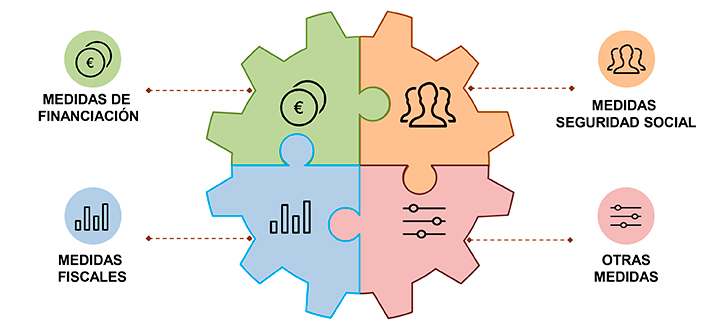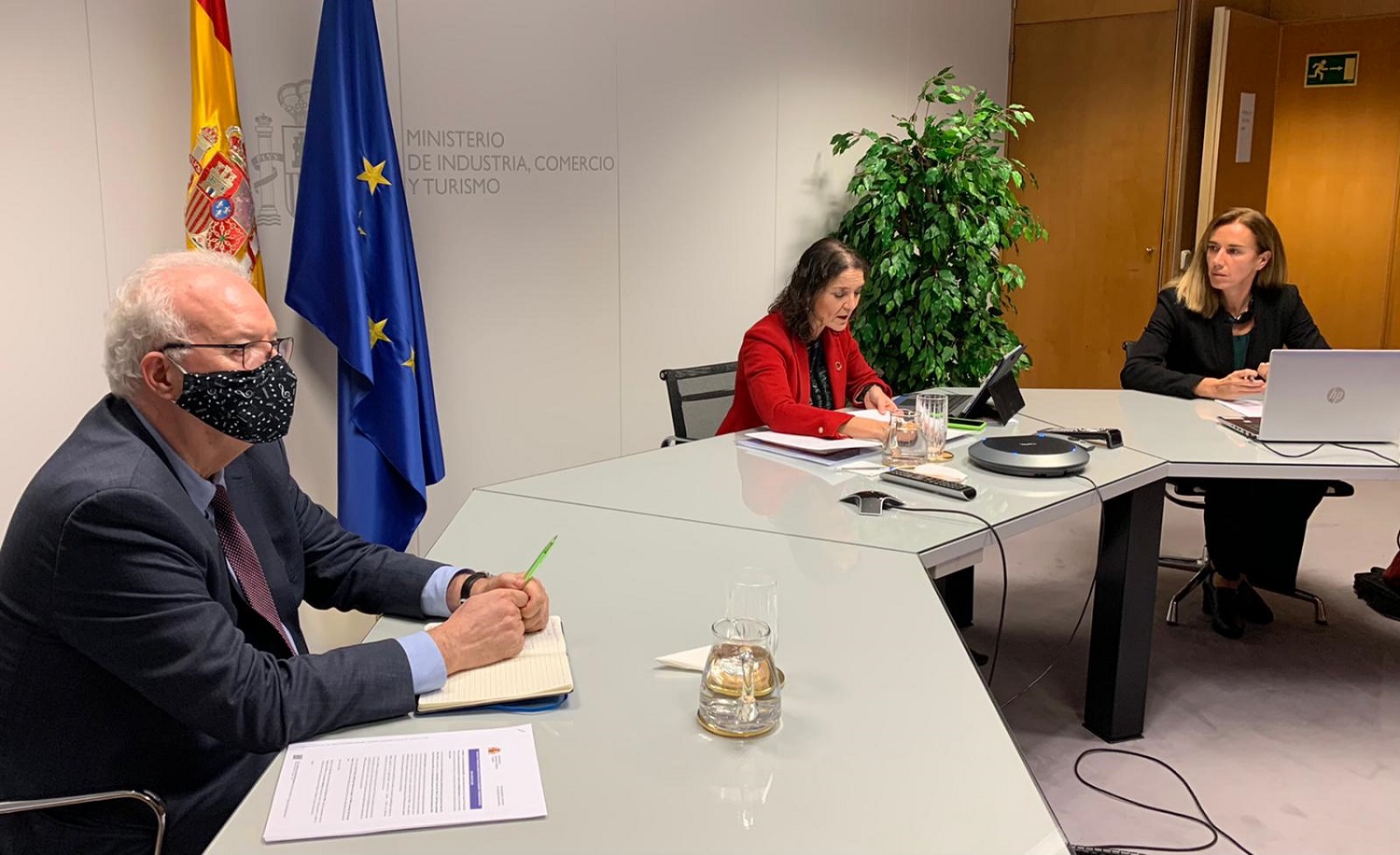COVID-19 currently
- What is COVID-19?
-
Coronaviruses are a family of viruses that normally only affect animals, but in some cases may be transmitted to the people. The SARS-CoV-2 is a new type of coronavirus first detected in december 2019, the chinese province of Wuhan. This new virus can affect people and produces the disease COVID-19 (infectious disease by coronavirus -19).
The emergency committee of the international health regulations (RSI, 2005) has declared the current outbreak of new coronavirus as a public health emergency of international importance (ESPII) at its meeting on 30 january 2020, and the world health organization (WHO) has raised the 11 march in the category of global pandemic situation caused by the COVID-19.
The most common symptoms include fever, cough, and feeling of a lack of air. In some cases, there may also be digestive symptoms like diarrhea and abdominal pain.
The main vulnerable groups are over 60 and those diagnosed with hypertension, diabetes, cardiovascular diseases, chronic lung disease, cancer, inmunodeficiencias and pregnancy by the precautionary principle.
The ministry of health updated daily theSituation in SpainandInformation for citizenship.
- In the world COVID-19
-
The response to the global pandemic has occurred in all countries in the framework of the recommendations and guidelines of the world health organization.
Since the european commission, a coordinated economic response to the outbreak of COVID-19. At the same it includes an analysis of the effects of this outbreak, as well as a series of actions have already made and proposed measures to mitigate their losses.
Measures against the European Commission COVID 19 [PDF] [253.96 kB]19/03/2020
- Impact of COVID-19 in spain
-
The expansion of COVID 19 is causing a health crisis with impact on economic sectors. The authorities in Spain are taking all necessary measures to curb the spread of hiv and mitigate its impact on the national economy. Since 14 march, has been declared a state of alarm throughout spanish territory.
According to information gathered by the ministry of industry, commerce and tourism, the main impacts on their areas of activity are
- TheTourismit is a strategic sector for spain provided by 12.3 per cent of theGDPand 12.7 per cent of employment, and while it is still early to assess the impact that the Covid-19 will have on the influx of tourists to the spanish destinations in the medium term, the maintenance of the health crisis is already having an impact on the sector, owing to restrictions on the free movement of people and reduced demand of tourism services by uncertainty and the effect of caution.
On 6 march, the world tourism organization revised its prospects for international tourist arrivals by 2020, within a -1% -3%, which is estimated loss of between 30,000 and 50,000 million (.) in revenues from tourism. Before the outbreak of COVID-19,WORLD TOURISM ORGANIZATIONhe had envisioned a positive growth of between 3 and 4% for this year.
Our country has experienced before other crises and situations of global uncertainty (financial crisis, the icelandic volcano, etc), but in the case of COVID-19 and its global expansion, we are witnessing an extraordinary increase in cancellations and a progressive and significant drop in demand for tourism services in the short and medium term, both in the market issuer and receptive and therefore, the entire value chain of the spanish tourism industry.
- It is still early to know the impact that will have the health crisis Covid-19 into the flows of foreign trade and foreign investment in spain as it will depend on the severity and duration of the pandemic and how much should extend the restrictions laid down to contain the disease as well as the capacity to have economic policy measures being taken to mitigate its impact on the economy. We know that this impact will be considerable since march (when it started to spread the COVID-19 in europe) but we know how the whole year, because there is still uncertainty about the time necessary to control their expansion, both in spain, as in the rest of our trading partners.
TheIMFconsiders that the world economy will shrink by 3 per cent by 2020, since a growth of 3.3 per cent in january this year itself.IMFrecognizes that its forecasts are subject to a degree of uncertainty very higher than usual and it is likely to be revised to be gained by clarifying the scope of the crisis. In any event, these figures help to understand why the rapid expansion of the coronavirus has been an unprecedented negative shock for the world economy, which had been a phase of weak growth.
Strict confinement necessary to contain the pandemic, proceeded to the economy to a period of hibernation in much of the economic and commercial activity must stop. Inevitably this restriction of economic activity hampers the ability of firms to export, import and make new investments. This comes, in some cases, the difficulty of gaining access to some raw materials and components from abroad. The limitations on the national and international mobility directly affect services such as transport and tourism. Moreover, the restriction of movement of people (consumers) has caused a sharp fall in consumption, both local and imported products. In addition, the drop in income caused by the crisis will lead to a weakening of consumption and investment, both of spanish goods and services as coming from the rest of the world.
TheWTOexpected a decline of global merchandise trade resulting from the health crisis of between 13 and 32 per cent this year, according to areportpublished on 8 april. For europe, this study expected by 2020 a drop in exports from 12 per cent and imports by 10 per cent in the optimistic scenario, and 33 per cent and 30 per cent, respectively, in the doomsday scenario. It also suggests that it is likely that trade fall more strongly in sectors with complex value chains, in particular electronic equipment and automotive products, as well as in services, who are most directly affected by restrictions on transport and travel.
For its part,UNCTADconsiders that flows of foreign direct investment could be reduced by between 30% and 40 per cent during 2020-2021.
This drop in activity applies equally todomestic trade.Royal Decree 463/2020imposes no restrictions on movement of goods within the spanish territory. Similarly, the Royal Decree establishes the businesses that can open its doors to secure supplies of basic goods and. Therefore, the impact the coronavirus that in the retail sales will be asymmetrical in terms of specific products and services that are sold and the possibility of making electronic commerce. The royal decree of measures under the state of alarm it which allows the sale online or e-commerce, including in the businesses that cannot be open to the public during the crisis. In any case, is soon to make estimates on the evolution of sales in trade.
- TheTourismit is a strategic sector for spain provided by 12.3 per cent of theGDPand 12.7 per cent of employment, and while it is still early to assess the impact that the Covid-19 will have on the influx of tourists to the spanish destinations in the medium term, the maintenance of the health crisis is already having an impact on the sector, owing to restrictions on the free movement of people and reduced demand of tourism services by uncertainty and the effect of caution.
Government measures in response to the COVID-19 crisis
Since the COVID-19 healthcare crisis began, the government of Spain has adopted several measures to provide a comprehensive response to the exceptional effects of the pandemic on the economy, society, and employment.
These actions are contained in the COVID-19 Healthcare Crisis document published in the BOE.
Specific measures to companies, SMEs and the Self-Employed

Impact of measures on industry, trade and tourism
Many of the measures adopted have a specific impact on the sectors of industry, trade and tourism, as explained in the following note:
Note explaining industry, trade and tourism measures adopted [PDF] [521.33 kB] 01/06/2020
Practical guide of measures adopted for the Self-Employed [PDF] [1.06 MB] 08/04/2020
Guide to good practices in the workplace: Measures for the prevention of COVID-19 infections [PDF]
Impact of COVID-19 in industry, trade and tourism
News
Press office
-

Covid-19 Trade | 6/15/2021
-

Covid-19 Tourism | 12/18/2020
Tourism Ministry publishes a health recommendations guide amid COVID-19 for ski resorts
-

Covid-19 Industry | 12/14/2020
The Government puts SMEs in the center of the economic recovery post-Covid
-

Covid-19 Tourism | 11/25/2020
Tourism defends testing at origin to build confidence in travel
Novedades
News
- Instruction on the organization of the new normality in the ministry of industry, commerce and tourism Keep reading
- Good practice guide in the workplace Keep reading
- Interpretative note to the Industrial Sector on the implementation of the royal decree law 10/2020, of 29 march Keep reading



